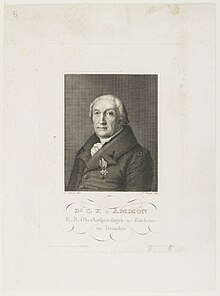Christoph Friedrich von Ammon

Christoph Friedrich von Ammon (January 16, 1766 – May 21, 1850) was a German theological writer and preacher. He was born at Bayreuth, Bavaria and died at Dresden.
Life
[edit]He was one of four sons born to Philipp Michael Paul von Ammon and Eleonore Maria Eusebia Griesshammer.[1] His father was a privy councillor attached to the Bayreuth court while his mother came from a family of clergymen. [2][3]
The family on account of the fathers position as a court official thereresided in Osternohe during the childhood of von Ammon and his siblings.[4]
Through his brothers daughter he was the grand-uncle of the author August Engelhardt.[5]
Education
von Ammon was educated by private teachers. He also recieved from his relatives like his maternal grandfather Christoph Heinrich Griesshammer whom he often visited and his father's brother. He also recieved guidance from the Lutheran theologian Friedrich Immanuel Schwarz.[6]They encouraged him and instilled a love for languages and sciences. .Additonally he read Homer , studied the Hebrew language , learned to act out the prose and metrical writings of the Old Testament and was therefore immediately placed in the top class of the Gymnasium in Bayreuth on January 19, 1783. [1]
Career
[edit]He studied at Erlangen, held various professorships in the philosophical and theological faculties of Erlangen and Göttingen, succeeded Franz Volkmar Reinhard (1753–1812) in 1813 as court preacher and member of the Upper Consistory of the Church of Saxony at Dresden, retired from these offices in 1849.[7][8]

Seeking to establish for himself a middle position between rationalism and supernaturalism, he declared for a "rational supernaturalism," and contended that there must be a gradual development of Christian doctrine corresponding to the advance of knowledge and science. But at the same time he sought, like other representatives of this school of thought, such as Karl Bretschneider and Julius Wegscheider, to keep in close touch with the historical theology of the Protestant churches.[8] The term Offenbarungsrationalismus ("epiphanic rationalism") has been used to express Ammon's intermediate views.[7]

He was a man of great versatility and extensive learning, a philologist and philosopher as well as a theologian,[7] and a very voluminous author. His principal theological work was the "Fortbildung des Christenthums zur Weltreligion", in 4 volumes (Leipzig, 1833–1840); "Entwurf einer reinen biblischen Theologie" appeared in 1792 (2nd edition, 1801), "Summa Theologiae Christianas" in 1803 (other editions, 1808, 1816, 1830); "Das Geschichte des Lebens Jesu" in 1842, and "Die wahre und falsche Orthodoxie" in 1849.[8]
Von Ammon's style in preaching was terse and lively, and some of his discourses are regarded as models of pulpit treatment of political questions.[7][8]
Marriage
[edit]In 1790 the 31 July at Erlangen he married Elisabetha Breyer, daughter of clergyman and philopsopher Johann Friedrich Breyer.
They had one son;
After her death von Ammon married a second time at 9 June 1823 ; Marianne Becker, daughter the court councillor and former inspector of the Cabinet of Antiquities Dr. Becker. This marriage was without issue.
Death
[edit]References
[edit]- ^ a b Fikenscher, Geo Wolfg Aug (1806). Vollständige akademische Gelehrten Geschichte der Königlich preussischen Friedrich-Alexanders Universität zu Erlangen von ihre Stiftung bis auf gegenwärtigen Zeit (in German).
- ^ Fikenscher, Geo Wolfg Aug (1806). Vollständige akademische Gelehrten Geschichte der Königlich preussischen Friedrich-Alexanders Universität zu Erlangen von ihre Stiftung bis auf gegenwärtigen Zeit (in German).
- ^ Fränkisches Archiv ¬Des ¬Fränkischen ¬Archivs ... ¬Band (in German). Mizler. 1791.
- ^ Neuer nekrolog der Deutschen ... (in German). B.F. Voigt. 1852.
- ^ "VERENA Friederika Karolina Engelhardt". geni_family_tree. 2022-04-27. Retrieved 2024-10-08.
- ^ Fikenscher, Geo Wolfg Aug (1806). Vollständige akademische Gelehrten Geschichte der Königlich preussischen Friedrich-Alexanders Universität zu Erlangen von ihre Stiftung bis auf gegenwärtigen Zeit (in German).
- ^ a b c d Ammon, Christoph Friedrich In: Neue Deutsche Biographie (NDB). Band 1, Duncker & Humblot, Berlin 1953, ISBN 3-428-00182-6, S. 253 f. (in German)
- ^ a b c d One or more of the preceding sentences incorporates text from a publication now in the public domain: Chisholm, Hugh, ed. (1911). "Ammon, Christoph Friedrich von". Encyclopædia Britannica. Vol. 1 (11th ed.). Cambridge University Press. p. 861.
- 1766 births
- 1850 deaths
- People from Bayreuth
- German philologists
- German Christian theologians
- Academic staff of the University of Erlangen-Nuremberg
- Academic staff of the University of Göttingen
- Members of the First Chamber of the Diet of the Kingdom of Saxony
- 19th-century German theologians
- German male non-fiction writers
- 19th-century male writers
